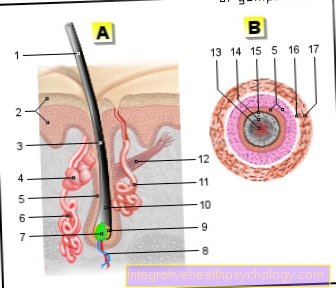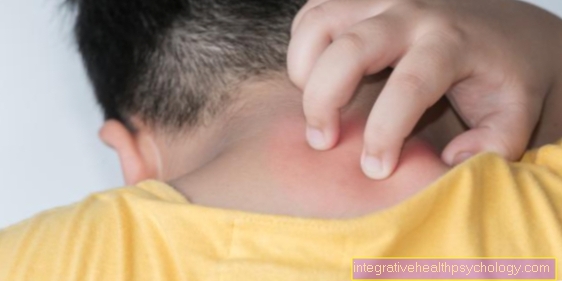Is my child ready for school?
introduction
In principle, children who have reached the age of six are considered ready for school. However, the decision to start school is not always that simple. Some parents worry whether their child is really ready for school. There are a few things that can be used to help determine whether a child is ready for school.
You might also be interested in this topic: school enrollment

How do I know if my child is ready for school?
A child is ready for school when they can express themselves in words and demand their needs and when they have certain social, motor and mental abilities. The language development of the child shows that a child can formulate wishes and needs and words. A child is only ready for school when they can say what they want and need. The following points provide indications of language development:
-
The child writes their own name and simple words
-
The child hears letters from individual words and shows interest in them
-
The child notices that words like "mouse" and "house" rhyme
In addition to language development, the child's social behavior plays an important role. It helps the child to adjust to the new situation and class if they are able to follow simple rules.You can tell that your child is ready for school when they can concentrate quietly for half an hour and can fit in with a group.
A child should sense the sensations of other children in a group. In addition, a child should be able to accept a "no" every now and then and to endure conflicts.
Cognitive skills should also be present in order for a child to integrate well into school. Concentration is particularly important. I can tell if my child is able to concentrate when they are able to concentrate calmly for twenty or thirty minutes.
In addition, a child should have certain motor skills in order to be fit for school. It should be dressed and able to use utensils such as scissors and pens without any problem.
I realize that my child is ready for school when they have gross motor skills to balance, do a jumping jack, and jump over something with both feet at the same time.
All of these points regarding language development, social behavior and motor skills are signs that your child is ready for school.
Learn more about this topic: Child development and schooling
What motor skills should my child have?
A child should have certain fine and gross motor skills before starting school. This significantly supports the child's independence.
When a child has a certain body control, they can do more tasks without help. Essential examples for the school are independent dressing and undressing as well as climbing stairs. These are motor skills that a child needs in school.
In addition, some motor skills are required so that the child can participate in class. A child should be able to use the necessary work utensils. In elementary school, this means that a child should be able to hold a pen properly and use scissors or glue stick.
A sense of balance and coordination can be tested by asking the child to hop, balance, do a one-legged stance and do a jumping jack. If a child has motor deficits here and there, these can be trained.
With patience and trust, one can help the child climb stairs alone or dress themselves.
Read more on the topic: School enrollment test
What mental abilities should my child have?
In order for a child to be ready for school, they should have certain cognitive skills. It is important that your child is able to concentrate on one thing for at least ten to twenty minutes.
Linguistic development also plays a major role. Your child should be able to communicate their wants and needs.
It is important that a child can say what they need. Understanding the language is just as important. A child should understand what the teacher and classmates are trying to say to them and respond appropriately. It is very important for a child to understand the teacher's instructions in school as this is a prerequisite for performing the tasks.
A child is ready for school when he knows the things and living beings in his environment and can name them. It should be able to formulate what it wants to say in clear sentences. Hearing and sight are also important skills. A child should be able to differentiate sounds and piece together a simple puzzle.
Pictures and figures, for example memory, and simple songs and rhymes are suitable for testing memory and retention. A child should be able to memorize simple rhymes and be able to correctly assign images in memory.
Another cognitive ability is thinking ability. A child should be able to recognize simple courses of action and describe them in words. In addition, a child should be able to recognize and name the main shapes and basic colors. Before a child goes to school, they should learn to be able to provide their name and age upon request. In addition, the child should be able to count to ten.
The points mentioned are only signs by which you can tell whether a child has the necessary intellectual abilities for school. All children are different and develop at different speeds and slownesses in different aspects. If the child has difficulties in certain points, they can usually be trained very well.
Read on about the topic of school enrollment: What should my child be able to do by the time they start school?
What social skills should my child have?
In order to get along well in school, it is important that a child can fit into a group. In a group, a child should show empathy for other children, be helpful, and enjoy playing with other children.
In a group there is sometimes conflict, which is why a child should be able to endure and resolve a conflict.
For example, the rules of the game should be understood and accepted. In addition, a child should be able to follow the teacher's rules and, if necessary, accept a "no" from time to time.
How big should my child be?
As part of the U-examinations, the pediatrician regularly checks whether the size of a child is within the normal range. The pediatrician then uses percentiles to show how tall the child is compared to other children of the same age. There are growth charts that show the child's growth and percentiles. If your child is in the 50th percentile range when they start school, this means that 50% of children of the same age are older and 50% younger. Then the child lies exactly in the middle. If your child is in the 3rd percentile, 97% of their peers are taller and only 3% shorter.
In most cases, the growth of children levels off by the age of two or three in a percentile along which further growth will proceed over the next few years. If there are indications of a stunted growth or if your child appears to be significantly larger or smaller than its peers, you should visit the pediatrician and discuss the abnormalities.
You might also be interested in this topic: U investigation





























